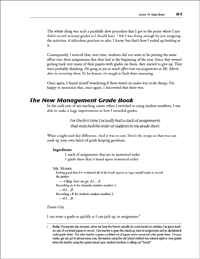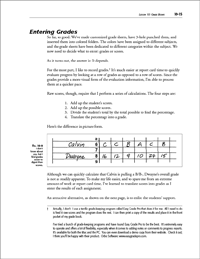

![]()
Goals for this lesson:
-
Learn how easy it is to record grades when you're using student numbers.
-
Learn how to set up your first New Management grade book.
-
Discover other techniques for making grade keeping manageable.
Sample Pages
Just click on a page image to see the page in PDF format.


![]()
FAQ Lesson 10
Do you grade every assignment?
Not really. I've learned to grade the essential assignments and just spot check the ones designed for practice. It takes a bit of experience to develop an eye for what is critical and what isn't. Although some teachers might say that every assignment is critical, I don't know how realistic that actually is.
If you're asking because you're concerned about your assignment correcting work load, think about focusing more on quality than quantity.
For example, instead of asking your students to write one spelling sentence for each of their twenty spelling words, why not ask for just five sentences? Since they're only going to be writing five sentences, you'll be able to ask that the sentences be high-quality, well-written ones.
This reduction in volume will do two things. It will: 1) cut down on the amount of sentences you'll have to check; and 2) lead to an improvement in your student's writing ability. With only five sentences to write, they'll focus more on writing and less on just getting done with the assignment.
Is it okay to have students correct their own assignments?
There are benefits to doing this. However, the assignment has got to be one that is easy for them to correct. Anything that required extensive writing or accuracy of spelling and grammatical convention are not appropriate activities for students to correct.
Appropriate activities for them to correct would include: 1) multiple choice; 2) fill-in-the blank; or 3) any activity that is more objective than subjective. Math assignments that were computational would be a good example of an objective activity that would be relatively easy for students to correct.
For multiple choice correcting, write the answers on the board as you say them. If you don't, you are most likely in for umpteen variations on, "What was the answer to number 7?"
